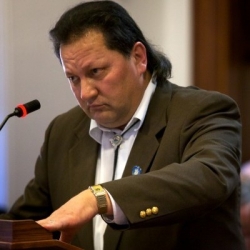The Maine House of Representatives voted against a bill which would have sent a casino decision to the Supreme Judicial Court. LD 1201 lost by a close 73-67 vote on Monday.
If passed, the question of whether to authorize land-based tribal casinos in Maine would have gone to the Supreme Judicial Court. Under the Maine Constitution, either the House, Senate, or governor can ask the Maine Supreme Judicial Court to make a decision on “important questions of law“.
Several times since his inclusion in the Maine State Legislature in 2013, Rep. Henry John Bear of the Houlton Band of Maliseet Indians has brought measures before either the Maine Senate or the Maine House. In each case, the measures were voted down.
LD 1201: Henry John Bear
LD 1201 lost in the Maine Senate by a 21-13 vote earlier. Though previous measures have failed, it is expected the proposal will have more votes in both chambers, due to the closeness of the votes.
When asked to defend the measure, Rep. Henry John Bear said it came down to a simple matter of dignity. The Houlton Band of Maliseet Indians, like other Maine Native Americans, have dealt with poverty for generations, as they tried to find their place as a minority in a much different society. US gaming law gives Native Americans a chance to build casinos on their reservation lands, because the US federal government recognized them as sovereign nations in treaties long ago.
Given a choice between dependence on the state or a chance to build an economic future on sequestered tribal lands, the Houlton Band want approval to build a business. Rep. Henry John Bear, who is a non-voting member of the legislature, said in the House debate before the vote, “We need jobs. We want to pay our own way. That’s the simple response to the question to us of ‘Why do you want to do it? Why do you want gaming?'”
Maine Tribal Gaming
Under the 1988 Indian Gambling Regulation Act, Native American tribes can build land casinos on their reservation lands that are recognized as sovereign territory. As a general rule, the reservation lands need to have been recognized by the Indian Affairs Bureau of the US Department of the Interior before 1934.
If lands were not designated before that time, tribes can apply to the Interior Department and the state in which they reside for special status. That was the purpose of Henry John Bear’s measure in the Maine House of Representatives this week.
Supreme Judicial Court Vote
The Maine Constitution states that the governor of the state, the House of Representatives, or the State Senate can ask the Supreme Judicial Court to “give their opinion upon important questions of law, and upon solemn occasions”.
Under those circumstances, Rep. Henry John Bear only needed 4 more votes in Monday’s vote to have sent the question to the state’s high court (by a 71-70 margin). The Maine Senate vote missed by 5 votes, which is why more votes can be expected in the coming months and years.
Little Casino Tradition in Maine
Most who oppose the measures argue that Maine does not have an agreed-upon gaming strategy or rules for casino regulators, though two commercial land-based casinos exist in Maine. A proposal for a third Maine casino failed to pass in a statewide referendum last year, due to considerable controversy.
Though the makeup of the Maine State Legislature could change in the November 2018 mid-term election, that may not have a major impact on voting among lawmakers. Gambling is considered a non-partisan issue, with members of both parties allowed to “vote their conscience” free of their party’s whip.
2014 Maine Casino Hearings
In a 2014 hearing on tribal gaming, the owners of Maine’s two existing casinos, Hollywood Casino in Bangor and Oxford Casino in Oxford, argued that the state has reached a saturation point with casino gambling. Adding any more land casinos would put all of the operations in danger, because the state would not have enough gamblers to support all the businesses.
In the past, Massachusetts gamblers might have flocked to Maine’s casinos. In 2018, the $900 million MGM Springfield opens. In 2019, the $2.4 billion Wynn Boston Harbor (or whatever it is called then) will have its grand opening. When those casinos are live, Massachusetts gamblers, including Bostonians, will be able to gamble near their hometown.

